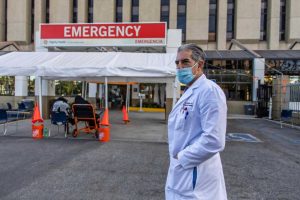We need more doctors. Do doctors need less medical school? COVID is forcing the question.

To help fight the COVID-19 pandemic, a number of medical schools are permitting students to graduate early in their final year. This development brought to mind a memorable letter I received when I was dean at the University of Virginia School of Medicine. Medical school usually lasts four years, and this letter came from the mother of a fourth-year student. She said her daughter had had a lot of time off and was about to fly to Tanzania to go hiking. She wondered whether she and her husband should be paying for this and whether it helped their daughter to be a better doctor
Good questions. I have asked myself the same things, and more. As I look back, when I attended Duke medical school, Duke had just started a new two-year base curriculum. The 1966 change meant the final two years of the four-year program were largely research and work with patients. Did that help to make better doctors? Or worse doctors? Maybe two years is enough.
We don’t know.
Shorter training means more doctors
Why does that matter to all of us? Because if we shortened the curriculum by just one year, more physicians could graduate and the projected shortage, as high as 139,000 physicians by 2033, could surely be eased.
To the parent’s question, first we need to define a “better doctor.” I have had a number of focus groups with patients and families and asked the question, What is a great physician? Not surprisingly, they listed good bedside manner, stays up to date to do the right thing, helps me to get better if they are sick and stay well, and the doctor is happy at work and at home. Patients can now get this information. We can all get data such as patient satisfaction, outcomes of patients taken care of by that physician, and measures such as deaths in surgery.
St. Mary Medical Center on Dec. 17, 2020, in Long Beach, California. (Photo: Apu Gomes/AFP via Getty Images)
These seem like reasonable goals. But are they the “right” goals? Who says? It is time for schools and patients and those who fund medical education to agree on what long term goals should be based on data, specifically what medical students should learn (there will always be some variation) and prove down the road that the students attained those goals. Could schools change what they teach?
Medical schools change curricula frequently. Fully 93.4% of medical schools are either in a curriculum change, just completed one or are contemplating a change soon. When one asks why all these changes, the answers are to make the curriculum better, or more up to date, or better for the students or increase board scores. Nothing wrong with those, but they may not work toward the important long term goal of making someone a better doctor.
Take whatever COVID vaccine you can get: All of them stop death and hospitalization.
Why not? A reasonable excuse is that previously, we were not able to connect present curricula with long term goals, but now “big data” methods are able to tease out what medical school and other education and life experiences contribute to later performance.
Medical schools must admit that they don’t even know what they don’t know. Finding out will not be easy because they don’t see a problem with the status quo. I have asked deans about exactly this issue. More than one answered in so many words that smart students go to medical school and it almost doesn’t matter what we teach them. They will learn.
Doctors don’t have to do everything
It is time for people who teach physicians to “zero-base” their curricula. The proper roles for the physician have changed. “Task-shifting” recognizes that physicians don’t need to do everything. Response to COVID-19 has demonstrated what data have shown for a long time: Nurse practitioners can function as primary care physicians in a number of settings.The curricula must be focused on the unique roles of the great physician and how to get there.
COVID-19 has stimulated schools to graduate students early. We don’t know whether that will make them better physicians. But this has exposed the secret that we don’t have long-term data leading to the great physician, however that is defined.
Making medicine work for Black America: How Black students will answer the call for reform
We should use this moment to study the question of how long medical school needs to be to achieve those goals. The analysis must be intense and based on evidence, and we may find that medical students only need three or even two years.
A shorter curriculum surely will yield savings to those paying the bills. But imagine that the saved one to two years could be used, as it is in many countries, as closely supervised public service to provide care in underserved areas. Less time in medical school will produce more graduates and help to reduce the physician shortage. Access to a great physician when you need one is fundamental to everyone’s health.
Dr. Arthur “Tim” Garson Jr. is Clinical Professor, Health Systems and Population Health Sciences, at the University of Houston College of Medicine and a member of the National Academy of Medicine. He is a former dean of the University of Virginia School of Medicine and a past president of the American College of Cardiology.
You can read diverse opinions from our Board of Contributors and other writers on the Opinion front page, on Twitter @usatodayopinion and in our daily Opinion newsletter. To respond to a column, submit a comment to [email protected].
Source: Read Full Article

